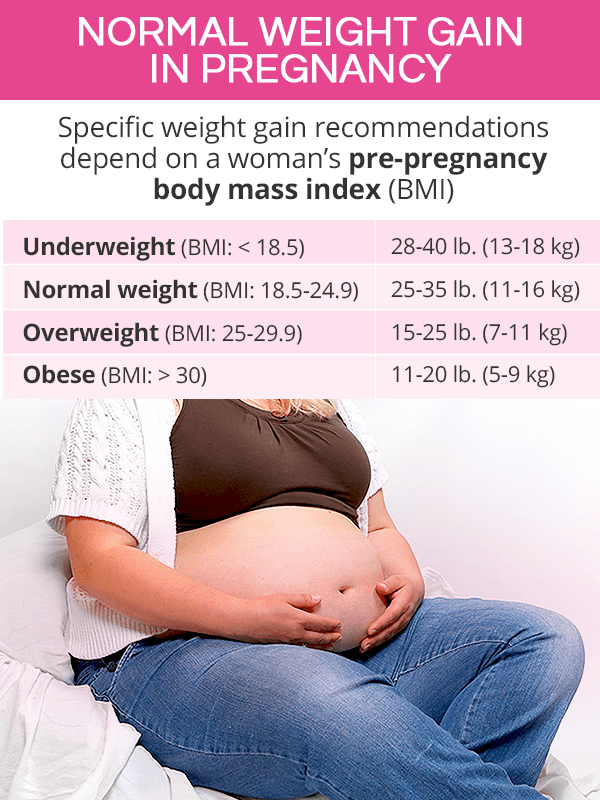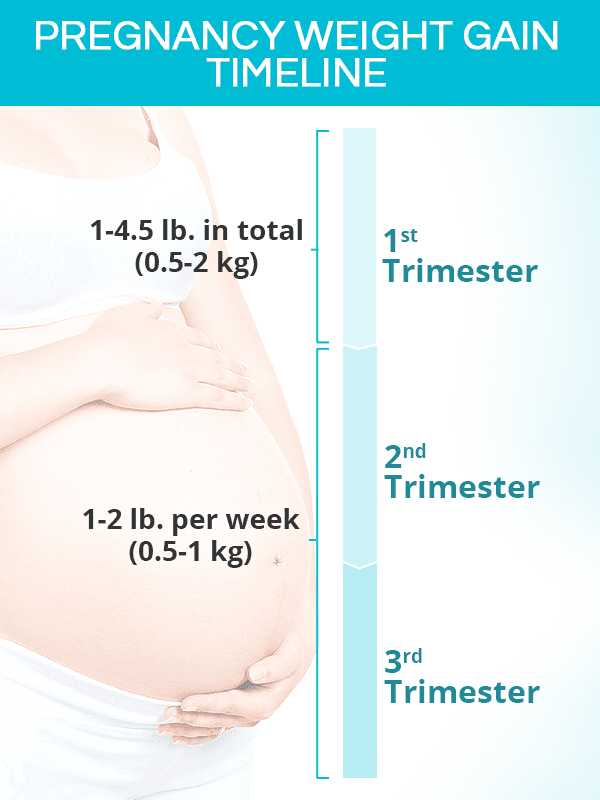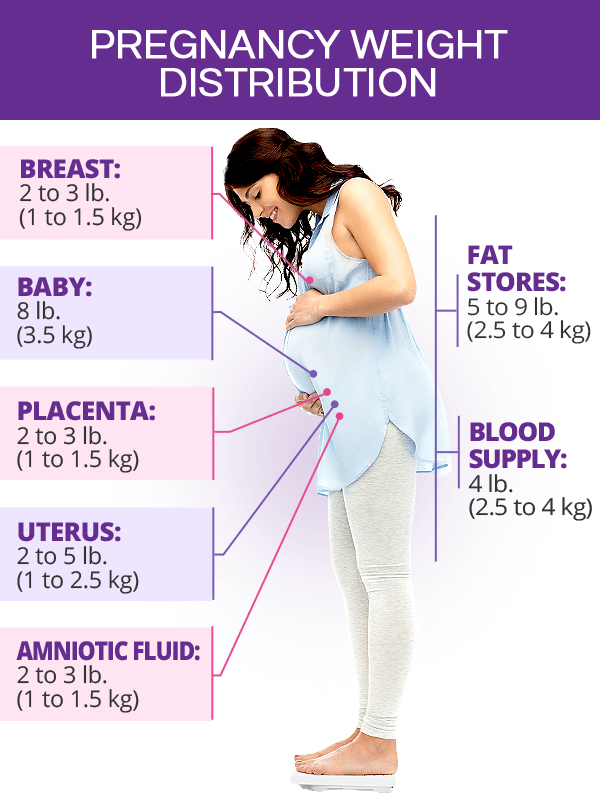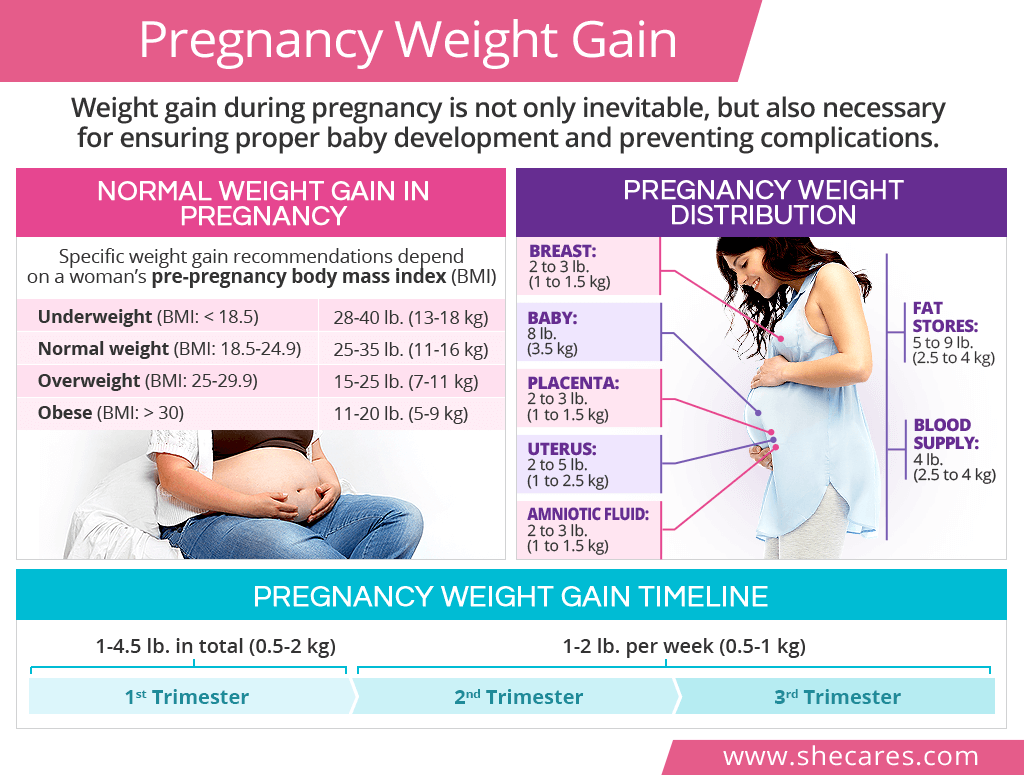What is a Pregnancy Weight Calculator?
Pregnancy weight gain calculator is an online tool that helps women monitor their weight gain during pregnancy and compare it to the official recommendations to ensure they are putting on pounds in a safe and healthy manner.
These pregnancy weight gain recommendations are not universal for all pregnant women. Instead, they are adjusted according to a woman's pre-pregnancy body mass index (BMI).
Normal Weight Gain during Pregnancy

Pregnancy weight gain is not only inevitable, but also necessary for the baby to grow and properly develop. However, how much weight a woman gains can drastically influence her pregnancy outcome.
Specific weight gain guidelines will vary for women carrying multiple twins or triplets as their prenatal needs are different from those carrying one baby.
Nevertheless, guidelines for a normal weight gain in pregnancy per BMI for a singleton pregnancy (one baby) are as follows:1
Pregnancy Weight Gain Timeline

It is important to remember that the rate of weight gain during pregnancy is not the same across all trimesters.
Weight Gain during First Trimester
In the first three months, women should gain no more than 1-4.5 pounds in total (0.5-2 kg).2 Those plagued with early pregnancy symptoms, like morning sickness and food aversions, might actually lose some weight during the first trimester.
Weight Gain during Second and Third Trimester
In the next two trimesters, the baby starts growing more quickly, and a woman's body changes rapidly to sustain pregnancy. As such, she is expected to put on 1-2 pounds per week (0.5-1 kg) in the second and third trimester.2 Sudden and rapid weight gain might be a sign of complications.
Pregnancy Weight Gain Distribution

Despite what many pregnant women might think, fat does not constitute all of the weight gain during pregnancy.
The majority of it is the baby's weight and structures within a woman's body that support his or her growth, including the following:3
- Baby: 7-8 lb. (3-3.5 kg)
- Blood volume: 3-4 lb. (1.5-2 kg)
- Uterus: 2-5 lb. (1-2.5 kg)
- Placenta: 2-3 lb. (1-1.5 kg)
- Amniotic fluid: 2-3 lb. (1-1.5 kg)
- Breasts: 2-3 lb. (1-1.5 kg)
- Fat stores: 7-9 lb. (9-4 kg)
Gaining Too Much or too Little Weight in Pregnancy
Improper weight gain during pregnancy increases the risk of a number of pregnancy complications and future health problems for the baby, including, but not limited to, the following:
- High birth weight
- Cesarean delivery
- Gestational diabetes
- Delivery complications like shoulder dystocia
- Preeclampsia
- Possibly develop diabetes in the future
- Post-pregnancy weight retention
- Low birth weight
- Premature birth
- Breastfeeding problems
- Lowered immunity
- Developmental delays
- Obesity during childhood
Gaining weight inadequately can also affect another essential prenatal measurement called fundal height. It is assesses the size of the uterus measured from the pubic bone to the top of the uterus as a reflection of the baby's growth. Poor pregnancy diet or obesity are key factors that may alter the fundal height measurement, calling for further evaluations.
Key Takeaways
Weight gain during pregnancy is not only an inevitable nuisance of being pregnant. It is a physical manifestation of pregnancy development, which can be measured and monitored to prevent complications and ensure baby's well-being. A woman with a normal BMI before conceiving is recommended to gain no more than 25-35 pounds during all three trimesters. However, no matter a woman's weight prior to conceiving, ensuring a steady and healthy pregnancy weight gain is possible by implementing a well-balanced, nutritious pregnancy diet with an additional 300 calories per day in the second and third trimester as well as maintaining a regular routine of 150 minutes per week of moderate-level exercise during pregnancy.
Sources
- American College of Obstetricians and Gynecologists. (2013). Weight Gain During Pregnancy. Retrieved June 19, 2019 from https://www.acog.org/Clinical-Guidance-and-Publications/Committee-Opinions/Committee-on-Obstetric-Practice/Weight-Gain-During-Pregnancy?IsMobileSet=false
- CDC. (2019). Weight Gain During Pregnancy. Retrieved June 19, 2019 from https://www.cdc.gov/reproductivehealth/maternalinfanthealth/pregnancy-weight-gain.htm
- Institute for Quality and Efficiency in Health Care. (2018). Pregnancy and birth: Weight gain in pregnancy. Retrieved June 19, 2019 from https://www.ncbi.nlm.nih.gov/books/NBK279575/
- King Edward Memorial Hospital. (2016). Fundal height: Measuring with a Tape Measure. Retrieved June 19, 2019 from https://www.kemh.health.wa.gov.au/~/media/Files/Hospitals/WNHS/For%20health%20professionals/Clinical%20guidelines/OG/WNHS.OG.FundalHeightMeasuringwithaTapeMeasure.pdf
- Mayo Clinic. (2017). What's the significance of a fundal height measurement? Retrieved June 19, 2019 from https://www.mayoclinic.org/healthy-lifestyle/pregnancy-week-by-week/expert-answers/fundal-height/faq-20057962
- Medline Plus. (2018). Managing your weight gain during pregnancy. Retrieved June 19, 2019 from https://medlineplus.gov/ency/patientinstructions/000603.htm
- Pregnancy, Birth, & Baby. (2018). Weight gain in pregnancy. Retrieved June 19, 2019 from https://www.pregnancybirthbaby.org.au/weight-gain-in-pregnancy
Footnotes:
- March of Dimes. (n.d.). Weight Gain during Pregnancy. Retrieved September 9, 2021 from https://www.marchofdimes.org/pregnancy/weight-gain-during-pregnancy.aspx
- Mayo Clinic. (2017). Pregnancy weight gain: What's healthy? Retrieved September 9, 2021 from https://www.mayoclinic.org/healthy-lifestyle/pregnancy-week-by-week/in-depth/pregnancy-weight-gain/art-20044360
- American Pregnancy Association. (2015). Pregnancy Weight Gain. Retrieved September 9, 2021 from https://americanpregnancy.org/pregnancy-health/pregnancy-weight-gain/
